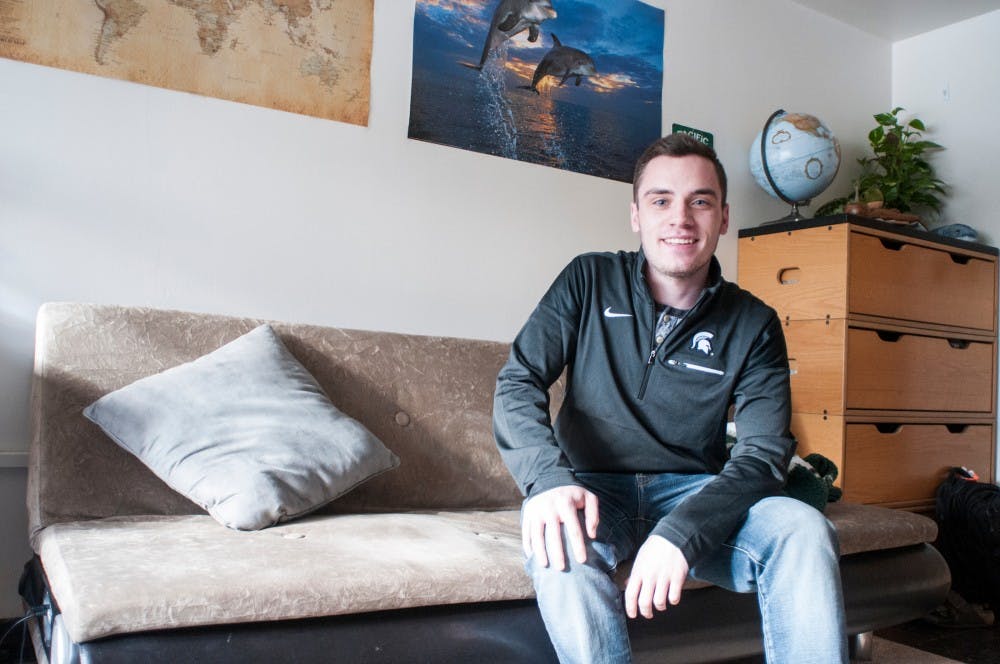Two years ago, environmental studies and sustainability sophomore Carter Helinski received news that changed his life. When looking at him, one would never guess the struggles Helinski has faced.
On the outside, Helinski is an average student. He is involved with multiple clubs on campus, he spends time in his dorm and he is pursuing his dream of environmental protection.
On the inside, there is a much larger story. Helinski has a hypoglossal schwannoma brain tumor, which is growing at a steady rate.
During his junior and senior year of high school, Helinski experienced pounding headaches that affected his everyday routine.
He visited the doctor and received a magnetic resonance imaging, or MRI, and the scan showed a cavernoma, or a small cluster of blood vessels, but the tumor went undetected.
During a checkup after another MRI a year later, Helinski received the news that he had a tumor. He said the location of the tumor and his age are both rare.
“Especially being so young, it’s even more rare,” he said. “Typically, they find them in people who are 40, 50 and 60. ... I kind of felt like I was going to throw up. I didn’t really know what to think. It was kind of surreal. I kind of felt like I was in a dream for awhile. What else now?”
In addition to the tumor, Helinski deals with Pediatric Autoimmune Neuropsychiatric Disorders Associated with Streptococcal Infections, or PANDAS, which he was diagnosed with when he was 4 years old.
“Whenever I get sick, instead of my antibodies attacking the illness they also attack the brain, which makes it inflamed, which can trigger off multiple things like 40 to 50 different symptoms,” Helinski said.
Helinski’s flare ups can include symptoms of anxiety and depression. He said this can make being in school difficult, but he keeps persevering.
“Pretty much every day you wake up and you figure out what kind of day it’s going to be and you go from there,” Helinski said. “It is pretty much an up in the air thing, hour by hour, day by day and minute by minute. I just kind of take things day by day. I try not to look at years.”
Helinski said there are two treatment options that include brain surgery or pinpointed radiation. He is planning to treat his tumor with one of the two options this summer.
People often react with sympathy or disbelief when he tells them about his health.
“Having so many things happening at the same time people think, ‘I don’t know how you get out of bed in the morning’ or, ‘I don’t know how you keep up with what you’re doing,’” Helinski said. “People say, ‘I could never do that if I was in your situation.’ Yeah, you could. If you’re in the situation you don’t really have a choice. ... When people say that it feels good, but I don’t want to feel like some hero or I don’t want to feel like some Superman because I am not.
“I am just going about everything like I typically would.”
Helinski said he won’t let his health affect his passion to save the environment and protect animals.
“You could go in an hour, you could go in five minutes, you could go 80 years from now ... so it’s pointless to go around with a negative attitude,” he said. “I definitely discovered that I am a lot stronger than I ever thought I was in terms of handling things on my own.”
Professor in the College of Agriculture and Natural Resources Rick Foster had Helinski in his class last semester and said he did not see Helinksi’s health issues hinder his schoolwork.
“He was always the first one in class and the last one to leave, and that wasn’t because of any kind of learning issue,” Foster said. “I admire him very much. ... We would engage in a lot of conversations because he was always there before class ever started sitting in front of me, and there was never a conversation of complaint, it was always an upbeat conversation.”
Helinski’s mother, Rachel Helinski, said she was in shock when she learned of the tumor. Carter’s father, Mark Helinski, had a brain tumor removed nine months earlier. She said his father helped inspire Carter during the past two years.
Support student media!
Please consider donating to The State News and help fund the future of journalism.
“The hardest thing is that you never want to see your kids suffer or have to go through something this life altering and he has already had a lot of challenges thrown at him in his life,” Rachel Helinski said. “He’s had to work twice as hard as everybody else at a lot of things and so I think it was always his goal to get to MSU and have that fighting spirit of, ‘You think I can’t do this? Watch me.’”
Discussion
Share and discuss “Student perseveres through brain tumor” on social media.







